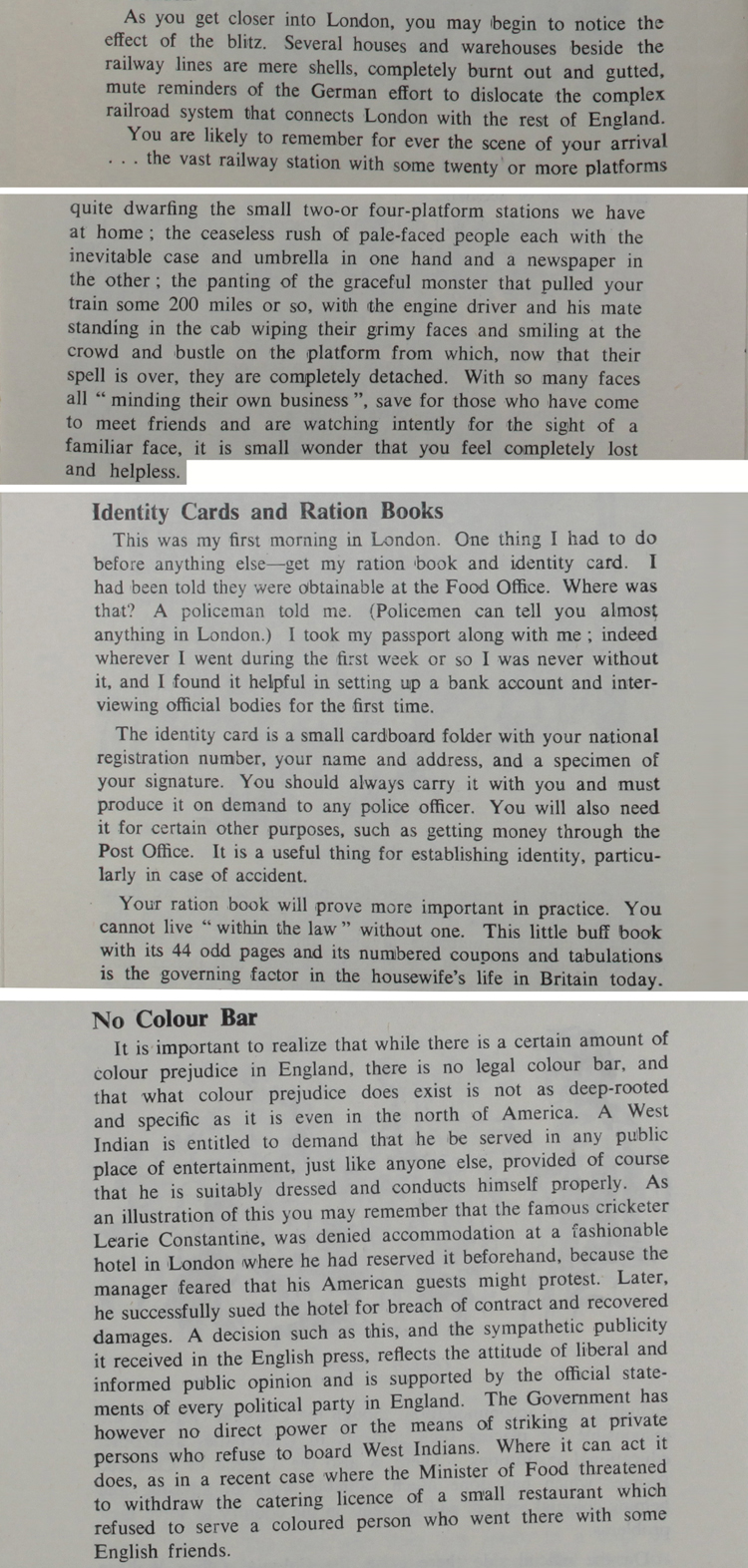
Extracts from a booklet produced in July 1950 by the Central Office of Information called “A West Indian in England” (CO 875/59/1)
Transcript
…
As you get closer into London, you may begin to notice the effect of the Blitz. Several houses and warehouses beside the railway lines are mere shells, completely burnt out and gutted, mute reminders of the German effort to dislocate the complex railroad system that connects London with the rest of England.
You are likely to remember forever the scene of your arrival…the vast railway station with some twenty or more platforms quite dwarfing the small two-or four platform stations we have at home; the ceaseless rush of pale-faced people each with the inevitable case and umbrella in one hand and a newspaper in the other; the panting of the graceful monster that pulled your train some 200 miles or so, with the engine driver and his mate standing in the cab wiping their grimy faces and smiling at the crowd and bustle on the platform from which, now that their spell is over, they are completely detached. With so many faces all “minding their own business”, save for those who have come to meet friends, and are watching intently for the sight of a familiar face, it is small wonder that you feel completely lost and helpless.
…
Identity Cards and Ration Books
This was my first morning in London. One thing I has do before anything else—Get my ration book and identity card. I had been told that they were obtainable at the Food Office. Where was that? A policeman told me. (Policemen can tell you almost anything in London). I took my passport along with me; indeed wherever I went during the first week or so I was never without it, I found it helpful in setting up a bank account and interviewing official bodies for the first time.
The identity card is a small cardboard folder with your national registration number, your name and address, and a specimen of your signature. You should always carry it with you and must produce it on demand to nay police office. You will also need it for certain other purposes, such as getting money through the Post Office. It is a useful thing for establishing identity, particularly in case of accident.
Your ration book will prove more important in practice. You cannot live “within the law” without one. This little buff book with its 44 odd pages and its numbered coupons and tabulations is the governing factor in the housewife’s life today.
…
No Colour Bar
It is important to realize that while there is a certain amount of colour prejudice in England, there is no legal colour bar, and that what colour prejudice does exist is not as deep-rooted and specific as it is even in the North of America. A West Indian is entitled to demand that he be served in any public place of entertainment, just like anyone else, provided of course that he is suitably dressed and conducts himself properly.
As an illustration of this you may remember that the famous cricketer Learie Constantine, was denied accommodation at a fashionable hotel in London where he had reserved it beforehand, because the manager feared that his American guests might protest. Later, he successfully sued the hotel for breach of contract and recovered damages. A decision such as this, and the sympathetic publicity it received in the English press, reflects the attitude of liberal and informed public opinion and is supported by the official statements of every political party in England.
The Government has however no direct power or the means of striking at private persons who refuse to board West Indians. Where it can act it does, as in a recent case where the Minister of Food threatened to withdraw the catering licence of a small restaurant which refused to serve a coloured person who went there with some English friends.
…
